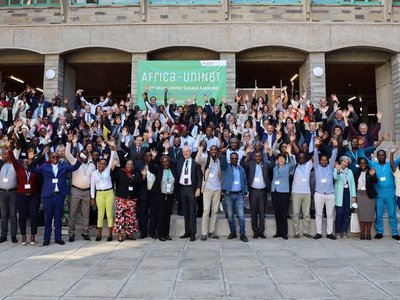

More than 130 representatives of universities and higher education institutions from Austria and 16 African countries met at Egerton University in Kenya from 17 to 19 October for the 2nd Africa-UniNet General Assembly and Erasmus+ cooperation seminar.
The aim of the event was to establish new and deepen existing science-, and research partnerships between higher education institutions. Moreover, experiences and challenges of international academic cooperation were discussed. The participants appreciated the opportunity to (re-)connect in person after a long break, due to the COVID-19 pandemic.
During the 2nd General Assembly, members of the Africa-UniNet had the opportunity to meet again more than two years after the first General Assembly in Vienna. Since many new members joined the network since, it was the first opportunity for many to get to know each other and discuss the successes and challenges of the past two years. Two new members, the Austrian Academy of Sciences (ÖAW) as well as the Austrian Foundation for Development Research (ÖFSE) were officially accepted as the latest members during the General Assembly. This brings the total number of members to 68 (26 from Austria and 42 from African countries). In addition, the board and the presidents of Africa-UniNet were elected as required by the Africa-UniNet statutes. The existing board and presidents (Univ.-Prof. Hubert Hasenauer as president and Prof. Nzula Kitaka as vice-president) were re-elected to allow the network to stabilize and mature after two challenging years.
The Erasmus+ Cooperation seminar provided an outstanding chance to learn about funding opportunities provided by the European Union in order to compliment the seed funding provided by Africa-UniNet. As the European Union significantly increased the funding for sub-Saharan Africa to 23% of external policy funds in the new Erasmus+ programme period (20021-2027), participants were keen on taking the opportunity to establish new institutional partnerships between Austrian and African higher education institutions, and arranging students-, staff- and teaching exchanges. In match-making sessions the university and higher education representatives informed each other about their specific fields of interests and institutional profiles to set the foundation for cooperation within Erasmus+.
It is expected that many new scientific-, and research partnerships will emerge from these personal encounters and that the cooperation in higher education between African countries and Austria will enter a new stage.
Following the intense three days of official program participants also had the opportunity to encounter the natural beauties of Kenya and explore the country, at least for a day.
A documentation of the event will be available at the OeAD website https://www.oead.at/kenia.

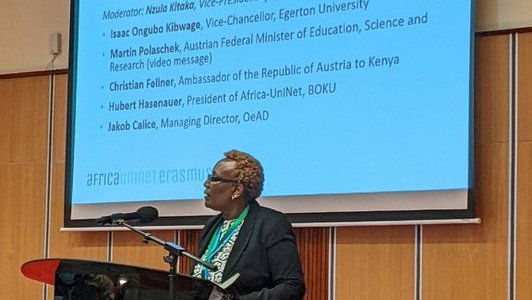
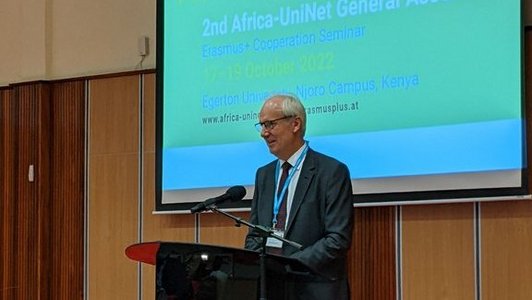
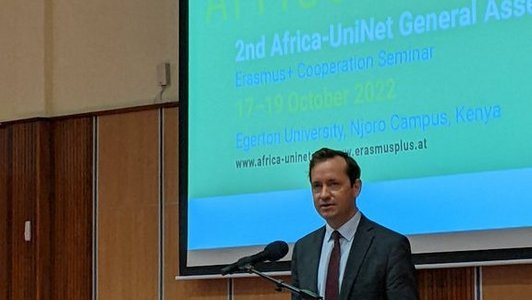
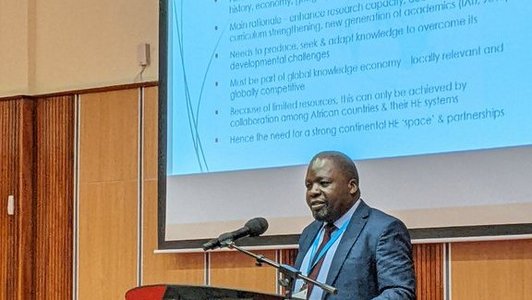
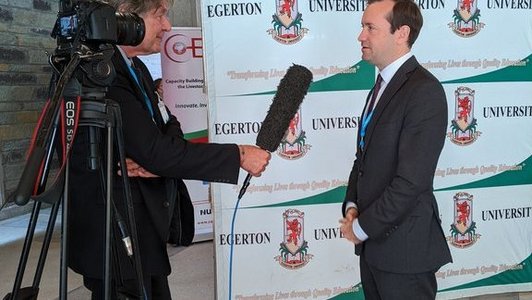
![[Translate to English:] Question from the audience](/fileadmin/Dokumente/_processed_/3/f/csm_Africa-UniNet_2nd_General_Assembly_Nina_Zuckerstaetter_OeAD-22_a9e88fc361.jpg)
![[Translate to English:] Egerton University lab](/fileadmin/Dokumente/_processed_/d/3/csm_Africa-UniNet_2nd_General_Assembly_Nina_Zuckerstaetter_OeAD-82_f0b224ac0b.jpg)
![[Translate to English:] tree planting in botanical garden](/fileadmin/Dokumente/_processed_/a/6/csm_Africa-UniNet_2nd_General_Assembly_Nina_Zuckerstaetter_OeAD-99_a3447581f4.jpg)
![[Translate to English:] tree planting in botanical garden](/fileadmin/Dokumente/_processed_/9/0/csm_Africa-UniNet_2nd_General_Assembly_Nina_Zuckerstaetter_OeAD-100_7b9711b7ba.jpg)
![[Translate to English:] group photo](/fileadmin/Dokumente/_processed_/c/0/csm__c__Egerton_University_1_5f5f976646.jpg)
![[Translate to English:] cutting the cake during reception by BOKU](/fileadmin/Dokumente/_processed_/5/6/csm__c__Egerton_University_10_ce36116e36.jpg)